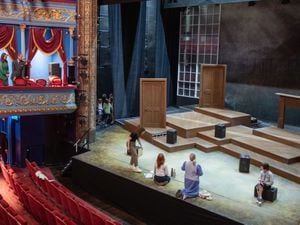Action ‘urgently required’ to save Scotland’s independent theatres, report warns
Bosses warned that without change, it could be the end of a ‘credible producing theatre sector’ in the country.

The boss of one of Scotland’s best known theatres has warned “fundamental sustained action is urgently required” to save the sector.
Alex McGowan, executive director of Glasgow’s Citizens Theatre, said venue closures and the “end to a credible producing theatre sector in Scotland” are a “very real possibility” without action.
He was speaking as a new report – commissioned by the Citizens and five other leading independent theatres in Scotland – revealed the country’s producing theatres had “collectively posted a deficit in three of the four pre-Covid years”.
The Disappearing Act? report, produced by Data Culture Change, added the impact of the pandemic had been “broad and deep” across the theatre sector.

“Some audiences have been slow to return and a sizable proportion of the ‘core’ frequent audience appears to have been lost,” the report found.
It added while special tax relief for theatre had made a “vital contribution” to finances, this is being reduced from 2025-26 – and it warned this will cause “significant additional challenges”.
The report continued: “As well as reduced income, there are now enormous pressures on costs across the business, including major rises in the price of utilities.”
Meanwhile, attracting and retaining skilled staff is said to be a “greater challenge than ever with wage expectations rising, reflecting increases in the cost of living”.
To tackle this, the report, commissioned by the Citizens, Glasgow’s Tron theatre, the Royal Lyceum Theatre Edinburgh, the Traverse in Edinburgh, Dundee Rep and Scottish Dance Theatre, and the Pitlochry Festival Theatre, recommends they work together.
It called for Scotland’s independent producing theatres to take “collaborative ‘federal’ approaches to production, marketing, learning and participation and the development of new income streams”.
In a bid to produce new Scottish work that will attract large audiences, both nationally and internationally, it recommends the theatres work together “to find ways to collaborate with experienced commercial theatre producers, that will support and co-produce popular shows that are expected to tour within Scotland and then go on for further commercial exploitation in other parts of the UK and internationally”.

The report comes after the six theatres sold a collective annual average of 423,000 tickets in the three years prior to the Covid pandemic, with joint turnover topping £20 million a year over that time.
In that period of 2017 to 2020, they also staged an average of 106 productions a year, of which 80% were commissioned and other new work.
But Mr McGowan said: “If the collective picture for our venues was bleak before the pandemic, the negative and continuing impacts of Covid-19 are potentially devastating.
“To avoid the risk of venue closures and the very real possibility of the end to a credible producing theatre sector in Scotland, fundamental sustained action is urgently required.
“We recognise change won’t be easy and are committed to responding positively and flexibly.
“We hope our funders, partners, colleagues and the public will find in this report all the reasons to support our transformation.”
Liam Sinclair, executive director of Dundee Rep and Scottish Dance Theatre, said: “Scotland’s producing theatres have been aware that the challenges we face have been building, and that in order to survive we needed to face some hard facts and tackle the issues head-on.
“We came together to commission Data Culture Change to produce this independent report to provide us with the robust data to inform actions we are committed to taking in order to protect the future of theatrical work made here and telling Scotland’s stories.”





